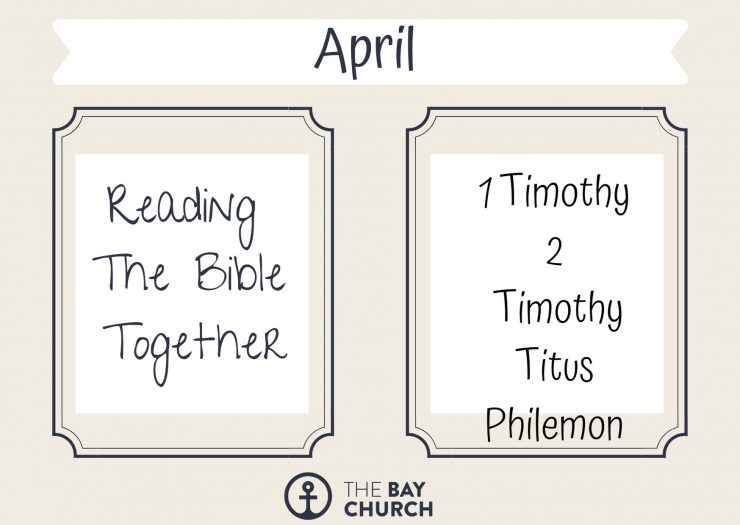April 2020
This month we have four New Testament books to explore together; 1 Timothy, 2 Timothy, Titus & Philemon. Below you will find introductions to those four books to help you as you read along.
1 Timothy – The first letter of Paul to Timothy
Background
1 and 2 Timothy and Titus are all addressed by Paul to younger men whom he had appointed to church leadership. They are called the Pastoral Epistles because of their practical teaching about ordering the life of the local church.
Timothy had travelled and learned with the apostle Paul [see Acts 16:1-3 and 20:4, and the greetings in several epistles, including Philemon]. Now Paul had left Timothy at Ephesus to supervise the church there. You can read more about the church at Ephesus in Acts 18-20, Ephesians and Revelation 2.
Key verse:
you may know how one ought to behave in the household of God, which is the church of the living God. 1 Timothy 3:14-15:
Outline [based on outline by Warren Wiersbe]
Chapter 1 The church and its message.
- 1-11 Teaching the true Gospel
- 12-17 Experiencing the Gospel.
- 18-20 Defending the Gospel.
Chapters 2-3 The church and its members.
- 2:1-8 Prayer in the church.
- 2:9-15 Women in the church.
- 3:1-13 Leaders the church.
- 3:14-16 What is the church?
Chapter 4 The church and its minister.
- 1-10 Withstanding falsehood.
- 11-16 Setting an example.
Chapters 5-6 The church and its ministry.
- 5:1 – 6:2 Advice about various age groups.
- 6:3-21 Assorted instructions
Common expressions
- “charge” [= give a solemn command] 1 Timothy 1:3, 5, 18; 4:11; 5:21; 6:13, 17.
- “A trustworthy saying” 1 Timothy 1:15; 3:1; 4:9. 2 Timothy 2:11. Titus 3:8.
2 Timothy – The second letter of Paul to Timothy
Background
This is the latest and also the most personal of Paul’s letters. He was in prison and expecting to be executed. He had left Timothy at Ephesus to supervise the church there but in this letter he asks him to come to see him. Paul observes that many people in the churches accept false teachings and fail to live consistent Christian lives.
Key verse:
You, however, continue in the things you have learned and become convinced of. 2 Timothy 3.14
Theme: Continuing
Paul urges Timothy to remain faithful to the Gospel of Jesus Christ and gives reasons for each exhortation. These reasons are based [a] on doctrinal truths and [b] on practical observations of behaviour and circumstances both inside and outside the church.
Outline
1.1-5 Greeting.
1.6-12 Exercise the gift of God and share sufferings.
Why? We are saved by God’s grace.
1.13-18 Retain the sound Gospel.
Why? Some others have turned away.
2.1-13 Endure hardship in passing on the Gospel.
Why? We are engaged in a spiritual war so that others may be saved.
2.14-26 Concentrate on essentials.
Why? False teachings spread disputes which lead to conflict and not godliness.
3.1-17 Continue proclaiming and obeying Scripture despite opposition and persecution.
Why? Scripture is dependable.
4.1-4 Preach the truth now.
Why? People tend to turn away.
4.5-8 Be active.
Why? Paul is approaching the end of his own service.
4.9-22 Closing greetings and instructions.
The letter of Paul to TITUS
Background
Paul worked with Titus to proclaim the Gospel on the Mediterranean island of Crete. Paul has now moved on and left Titus as temporary leader of the work in several towns on the island.
Purpose
To instruct a less experienced gospel worker in meeting the most pressing needs of the churches.
Themes
- Sound doctrine and good Christian behaviour go together.
- How to stand for the whole truth of the Gospel.
- The place of good deeds in salvation and the Christian life.
Outline
- 1.1-4 Greeting.
- 1.5-16 Conduct in Church life:
- 5-9 Appointing leaders;
- 10-16 Resisting false teachers.
- 2.1-15 Conduct in family and individual life:
- 1-10 Instruction in right living;
- 11-15 Incentive for right living.
- 3.1-11 Conduct in public life:
- 1-2 Instruction;
- 3-8 Incentive;
- 9-11 Contrast with wrong belief and behaviour.
- 3.12-15 Personal plans and greetings.
Common expressions
- Grace: (1.4; 2.11; 3.7, 15)
- Sound: (1.9, 13; 2.1, 2, 8)
- Doing what is good: (1.16; 2.7, 14; 3.1, 8, 14)
- Saviour:
- of God (1.3; 2.10; 3.4.)
- of Jesus (1.4; 2.13; 3.6.)
Problems facing Titus as a church leader
- How do you distinguish people who are really suitable to lead?
- How do you train people who are from different backgrounds from your own?
- How do you deal with people in the church who will not recognise your authority?
- How do you distinguish between important and unimportant matters of dispute?
- How do you train Christians in sound doctrine and godly behaviour when they are so strongly influenced by non-Christian beliefs and modes of behaviour?
The letter of Paul to Philemon
This is not one of the Pastoral Epistles. It was written earlier in Rome at the same time as Colossians, and carried to Colossae with that epistle. It includes greetings to and from the same people.
We find the reason why Paul wrote it within the letter. Philemon was one of the Christians in Colossae, converted through Paul’s ministry. Onesimus was Philemon’s slave. He had fled to Rome where he met Paul and became a Christian. Paul is now sending him back to Philemon, “urging his master to receive him back kindly and to receive this spiritual son of the apostle as a brother in Christ” [Herbert Carson].
“This Epistle affords a specimen of the highest wisdom as to the manner in which Christians ought to manage social affairs on more exalted principles” [A R Faussett].
“It is no mere casual note, but a carefully crafted and sensitively worded piece” [N T Wright].
The challenging question for us to think about as we read the letter is, “Exactly what was Paul asking Philemon to do?”





